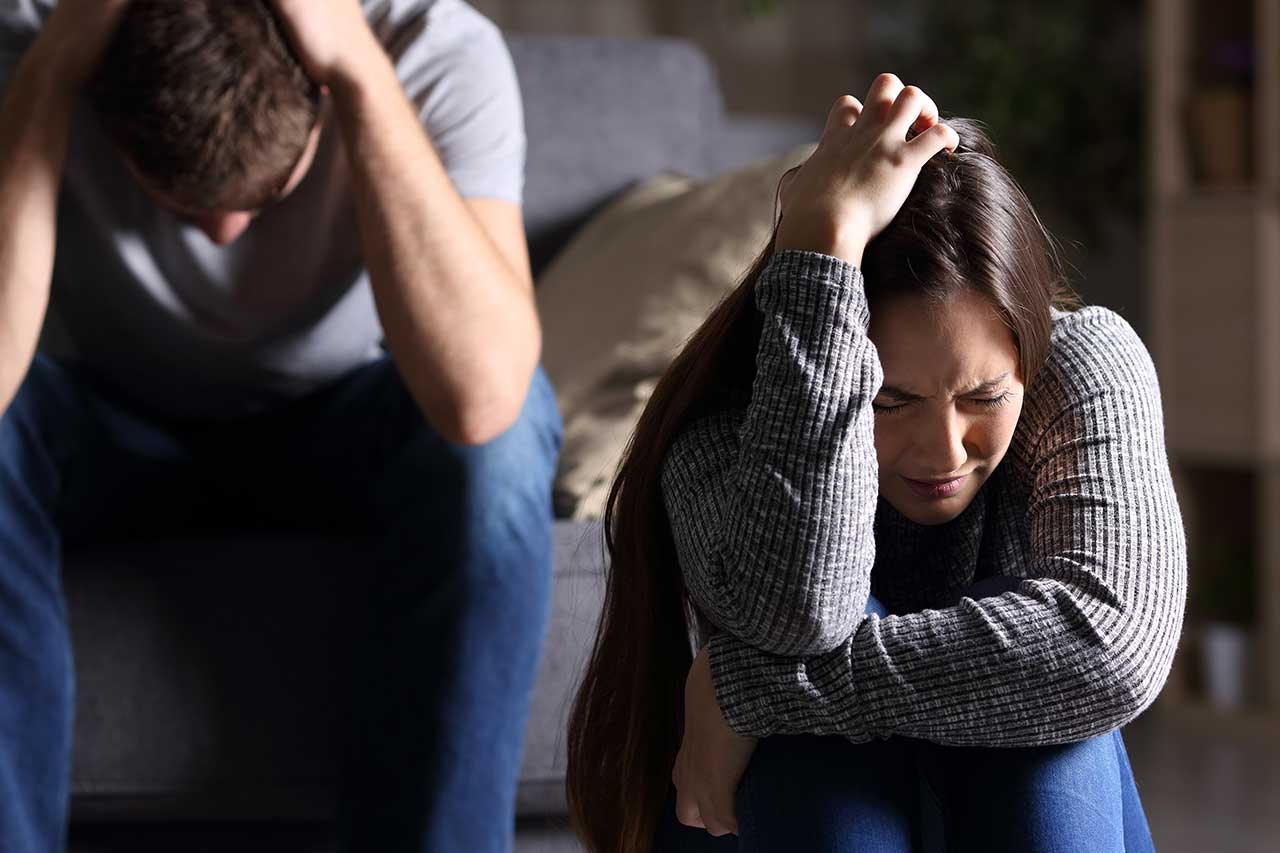Dating with anxiety can put a major strain on relationships and make it difficult to connect with others. Generalized anxiety disorder (GAD) is characterized by excessive worry over daily occurrences that usually don’t produce fear in others. For people with GAD, this intense sense of worry is difficult to control and can make it difficult for components of a healthy relationship – such as communication, empathy, and individual happiness – to thrive. But anxiety doesn’t have to ruin your relationship or put a strain on it to the point where it feels like an obligation. By understanding how anxiety affects relationships, you can love each other more deeply and connect in new ways.
How Does Anxiety Affect Relationships?
When someone struggles with anxiety in relationships, thoughts like, “What if he doesn’t love me as much as I love him?” or “What if she is lying to me?” can keep them up at night. There are also plenty of anxiety-motivated behaviors that people in relationships also display, such as irritability, controlling behavior, being easily distracted, avoidant or passive-aggressive behavior, and more.
Understandably so, these behaviors can lead to stress, confusion, and frustration in a relationship, especially in a partner who does not have anxiety. If you’ve ever thought, “Anxiety is ruining my relationship,” below are some issues to look out for and address with your partner.
Get a Free Insurance Verification Today!
"*" indicates required fields
Codependency
Many people with anxiety have an intense desire to be close to their romantic partners, often to the point where they need their consistent support and reassurance. Anxiety can trigger insecurity and challenging doubts, which can lead to overdependence and codependent behaviors.
In addition to being overly dependent, people with anxiety also tend to overthink nearly everything, expect the worst-case scenario, be indecisive, and struggle with an intense fear of rejection. These traits can become amplified in a romantic relationship and can make both partners feel inadequate, stressed, overworked, and miserable.
Tip: If you find yourself developing an overly dependent attachment to your partner, develop ways to cope with your anxiety and look to yourself for feelings of validation to remove the pressure from your partner. Self-love is also important to foster, especially if you have anxiety, so utilize methods like positive affirmations, journaling, and self-care routines to encourage self-love.
Communication is also key in a relationship, so in moments when you’re questioning your partner’s motives or become angry or suspicious, tell them how you feel. They can’t read your mind, so it’s better to try and explain to them how you’re feeling.
Additionally, cognitive behavioral therapy (CBT) is a great form of talk therapy that can help you come up with effective coping strategies for those moments when you need to reflect on your behavior or reassure yourself about what’s actually happening instead of what your anxiety is telling you.
Avoidance in Relationships
Then some people sit on the other end of the spectrum and avoid revealing their feelings to their partners altogether. Some people with anxiety disorders may avoid talking about negative emotions or being vulnerable with their spouses.
Those with anxiety who struggle with avoidance in a relationship may be described as cold, emotionally unavailable, lacking empathy, and standoffish. When a person is an avoidant closeness with others, they can create a lot of negative energy and distance in a relationship, which can make the other person feel inadequate, unloved, and unhappy.
While it may seem like this person doesn’t care, they may just be worried about how the other person will take the truth. They may be worried about their partner reacting negatively or getting upset at them. Individuals with anxiety might even feel ashamed for feeling certain things about their partner and may not want to share their thoughts for fear of judgment or being broken up with.
Tip: There’s a lot behind avoidance in a relationship, but communication is a key element of any healthy bond between people, so it’s important to break through that wall. If you’re the partner with anxiety, remind yourself that your loved one won’t always know what you’re thinking. If you’re upset about something they did or said, it’s okay and healthy to express it to them calmly so you guys can work it out.
Additionally, if you’re the partner who does not struggle with anxiety and you notice that your loved one is becoming distant, gently confront them about it. Reassure them that you’re there for them and willing to listen to whatever they have to say. While it may take lots of patience at times, it can make your bond stronger.
Chronic Tension
Another major issue that many people with anxiety battle with is constant tension. With worry comes tension, and since anxiety is characterized by excessive worry, it’s normal for diagnosed individuals to seem tense or on edge. If you’re on the receiving end of this tension, you may feel like you’re walking on eggshells around this person, which isn’t fun.
Tip: If you have anxiety, try to implement calming techniques in your daily routine to keep you calm. This can include anything from having a stress ball for squeezing to essential oils to taking bubble baths every night to help you sleep. Exercise is also great for reducing stress and boosting mood, so you should consider adding a 30-minute walk to your day-to-day routine, as well.
Help for Anxiety and Relationships
While there are plenty of tips you can try to manage your anxiety symptoms, it’s best to speak with a mental health professional to better understand the source of your disorder and how best to cope. Our Banyan Lake Worth rehab offers anxiety treatment that implements evidence-based therapy techniques like CBT to help clients develop healthy coping tactics and regain control over their lives.
In addition to mental health treatment, BHOPB also offers family and couples therapy to help partners understand how anxiety affects a relationship and help them recover from the impact of GAD. Not only do we encourage forgiveness and promote healing, but we also teach both partners how to best address anxiety symptoms to promote a healthy bond.
For more information about our mental health or addiction treatment in Lake Worth, call Behavioral Health of the Palm Beaches today at 561-220-3981.
Related Reading:
How to Overcome Zoom Meeting Anxiety













